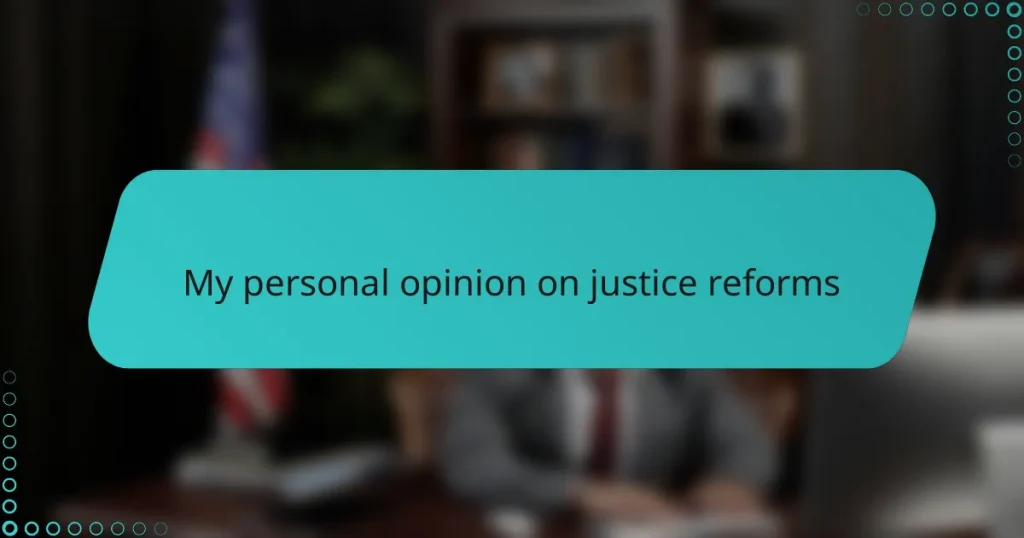Key takeaways
- Justice reforms aim to adapt legal systems for fairness, ensuring everyone has a fair chance and their voices heard.
- Key principles of legal advocacy include giving voice to the unheard, maintaining integrity, and demonstrating persistence in pursuit of justice.
- Common reform initiatives focus on reducing mass incarceration, enhancing police accountability, and eliminating biases in sentencing and trial practices.
- Effective reforms require community engagement, sustained political will, adequate funding, and transparency to be successful and build trust.
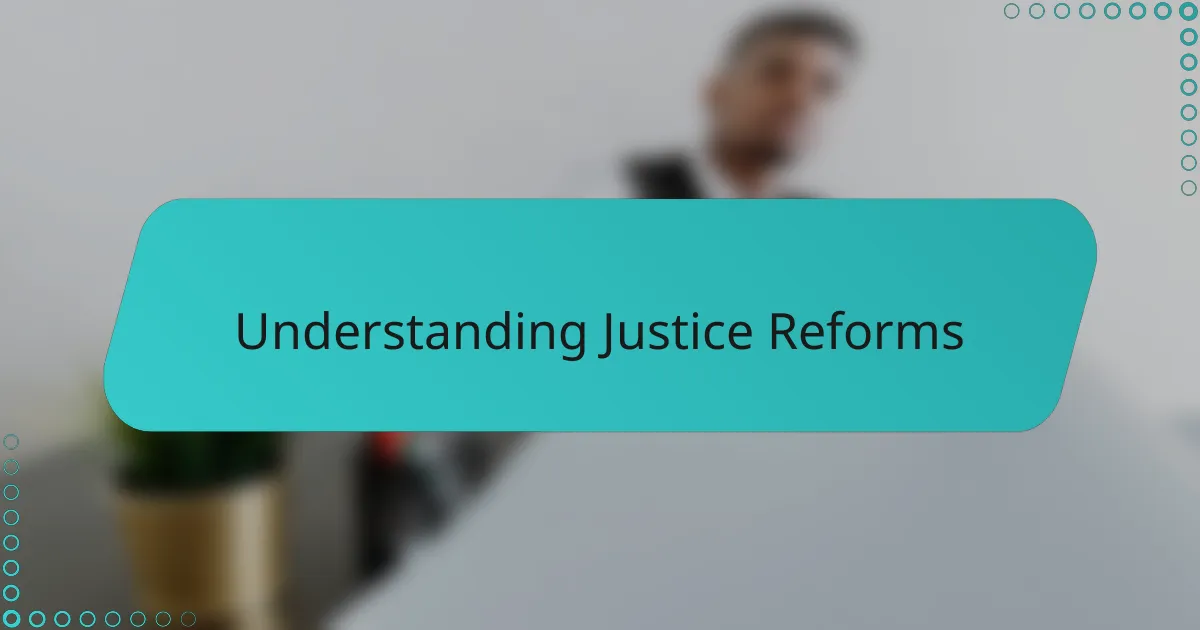
Understanding Justice Reforms
Justice reforms, to me, mean reshaping the rules and systems that govern fairness in society. I’ve seen firsthand how outdated laws can trap good people in cycles of hardship, and that’s why understanding these reforms is so important. What exactly makes a justice system just, if not its ability to adapt and grow?
When I reflect on justice reforms, I think about the impact they have on real lives—not just legal texts or court decisions. It’s easy to get lost in the technical jargon, but at its heart, reform is about ensuring everyone has a fair chance and their voices heard. Have you ever wondered how many lives we could change by simply rethinking how laws are applied or enforced?
From my experience working closely with legal advocacy, justice reforms are a ongoing conversation—a commitment to fairness that must be revisited regularly. This means questioning long-held norms and being willing to face uncomfortable truths. Isn’t that the essence of progress?
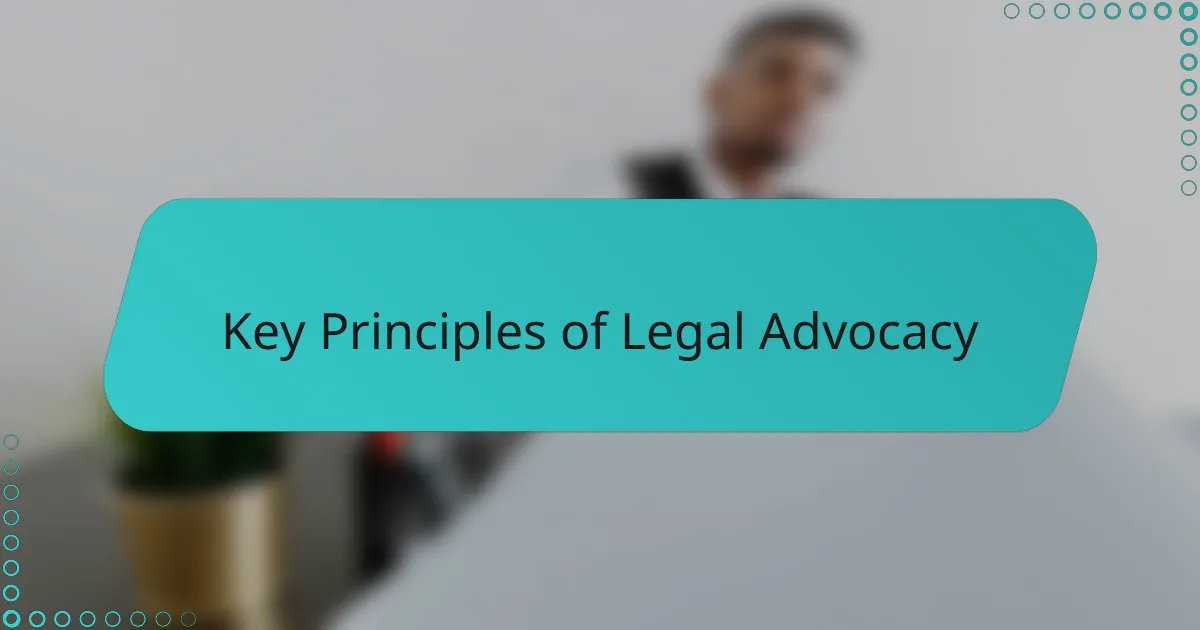
Key Principles of Legal Advocacy
Legal advocacy, in my view, hinges on one simple yet powerful principle: giving voice to those who are often unheard. I’ve witnessed how a well-articulated argument can shift not just a judge’s perspective, but the entire momentum of a case. Isn’t that what justice should feel like—being truly listened to?
Another principle I hold close is integrity. Advocacy isn’t just about winning; it’s about doing so with honesty and respect for the law’s spirit. I recall a case where standing firm on ethical grounds meant losing a shortcut but ultimately gaining trust and credibility that no victory could replace.
Lastly, persistence defines legal advocacy for me. Change rarely comes quickly or smoothly, and I’ve learned that every small step counts. When you keep pushing, even against the toughest odds, you become part of something bigger than yourself—a movement toward genuine justice. Have you felt that fire to keep going, even when the system tries to wear you down?
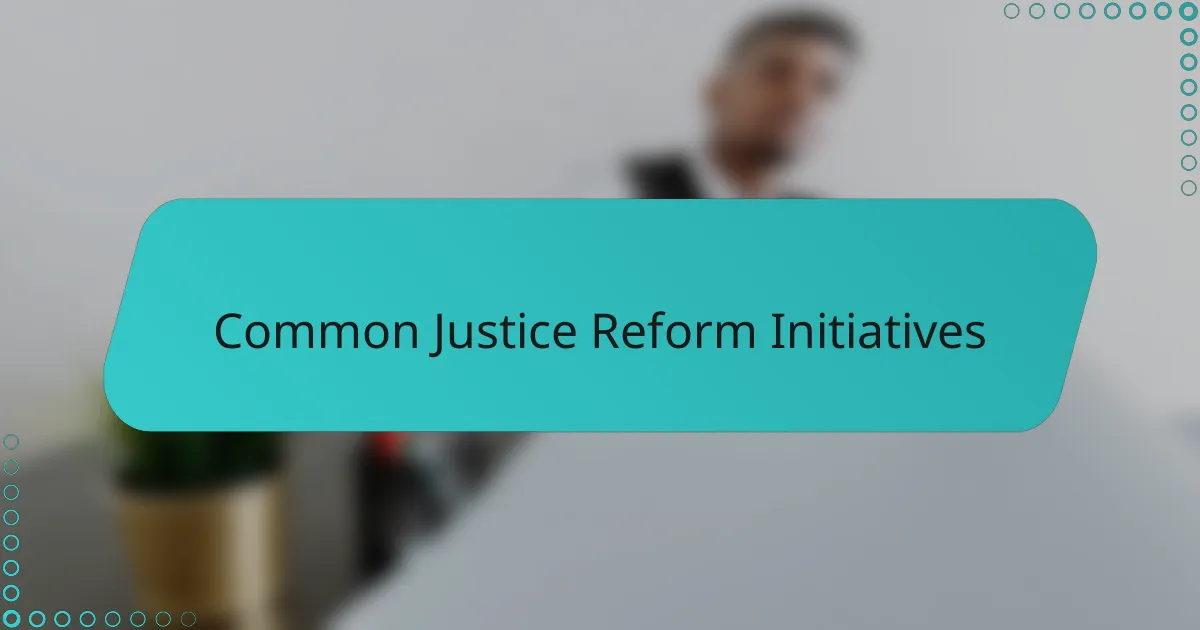
Common Justice Reform Initiatives
Common justice reform initiatives often focus on reducing mass incarceration by promoting alternatives like restorative justice and diversion programs. From what I’ve seen, these approaches don’t just cut numbers—they help heal communities by addressing the root causes of crime rather than just punishing offenders.
Another key reform I’ve noticed is the push for police accountability, including body cameras and independent oversight. I remember attending a community meeting where people shared their fears and hopes around this topic; it was clear that transparency could rebuild a lot of broken trust.
Finally, many reforms aim to eliminate biases in sentencing and trial practices. It’s striking how even small changes, like providing better legal representation for marginalized groups, can make a huge difference in ensuring fairness. Have you ever wondered how much justice changes when everyone truly gets a fair shot?
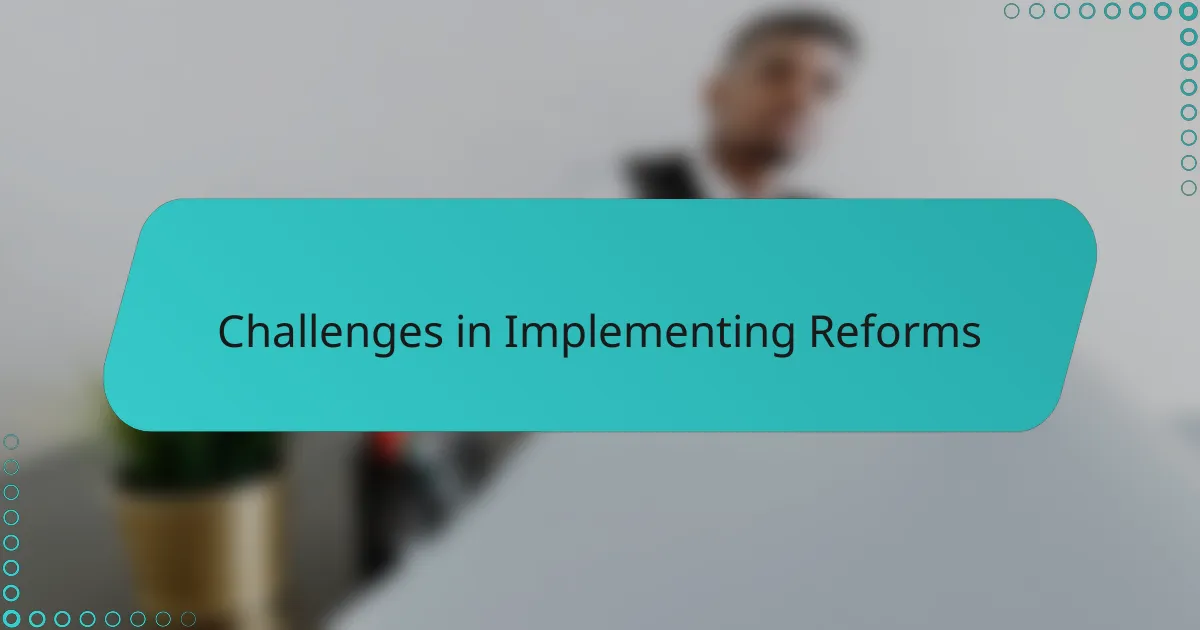
Challenges in Implementing Reforms
One of the biggest hurdles I’ve encountered in pushing justice reforms is resistance from those who benefit from the status quo. It’s frustrating to see how deeply entrenched habits and fears can stall meaningful change. Have you ever tried convincing someone to let go of something they’ve always known—even if it’s clearly flawed?
Another challenge lies in the complexity of legal systems themselves. Reform isn’t just about changing a law on paper; it demands shifting mindsets, training personnel, and overhauling procedures. I remember feeling overwhelmed when early efforts seemed to get lost in bureaucratic red tape, making me question if progress was even possible.
Funding and political will often feel like invisible walls too. Without consistent support, promising reforms risk being half-baked or abandoned altogether. I’ve seen passionate advocates burn out when resources dry up, which makes me wonder—how can we sustain momentum in an environment so prone to short attention spans?
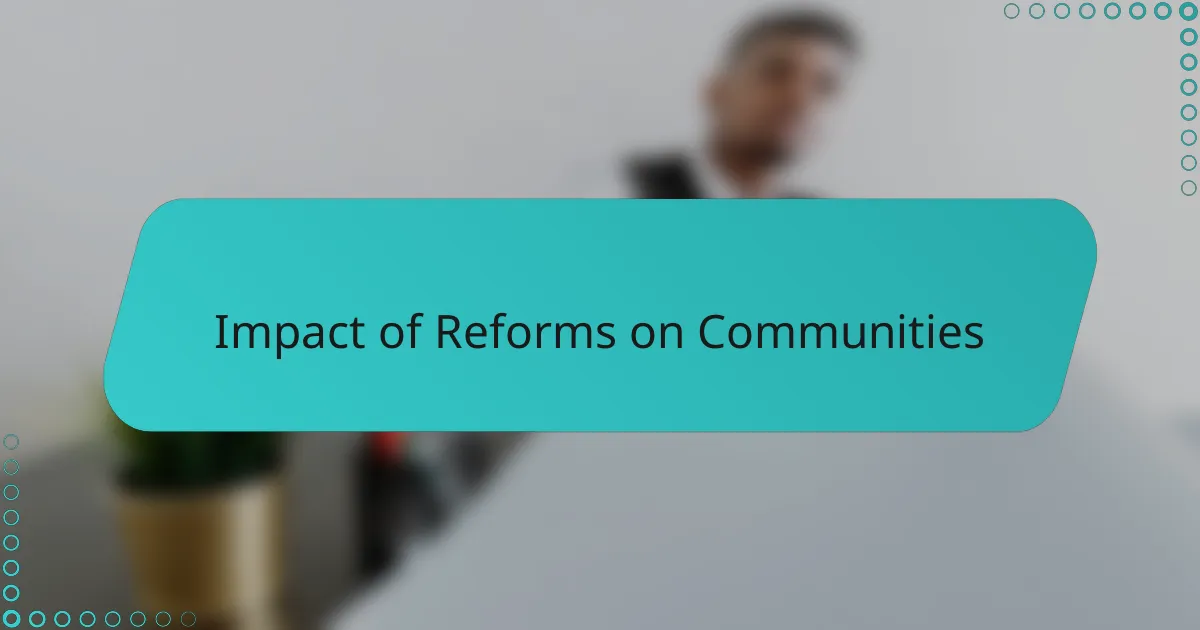
Impact of Reforms on Communities
When I look at how justice reforms touch communities, I can’t help but think about the real human stories behind the statistics. For example, I’ve met families who, after a diversion program was introduced, no longer live in fear of losing a loved one to prison. It’s powerful to see how a change in the system can restore hope and rebuild trust in places that felt forgotten.
But I’ve also noticed that reforms can trigger mixed emotions within communities. Some people feel cautious or even skeptical, wondering if these changes truly address their daily struggles or just serve as temporary fixes. That’s why I believe it’s crucial for reforms to be accompanied by consistent dialogue and transparency—otherwise, how can anyone feel confident that justice is truly being served?
At the end of the day, the impact of justice reforms isn’t just about policies; it’s about creating safer, more equitable neighborhoods where everyone has a chance to thrive. From my experience, when communities are actively involved in shaping reforms, the results are not only more effective but also foster a sense of ownership and pride. Isn’t that the kind of justice we should all strive for?
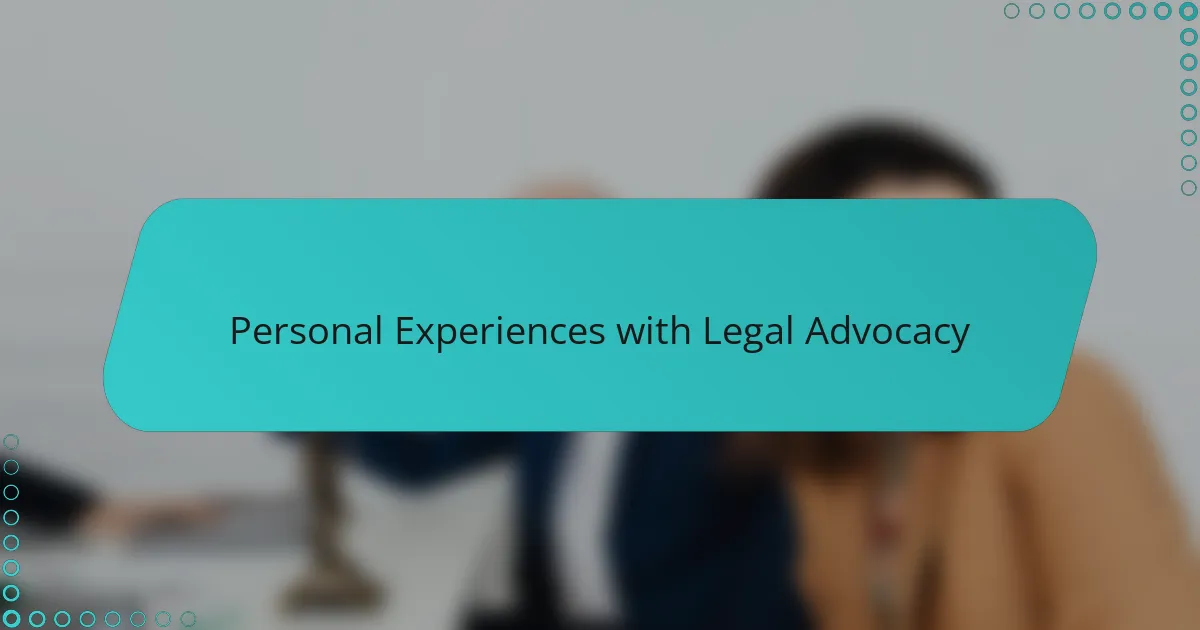
Personal Experiences with Legal Advocacy
I remember the first time I sat down with a client who felt utterly lost in the legal system; their story made me realize how crucial legal advocacy is in transforming abstract laws into tangible hope. Have you ever seen someone’s whole outlook change just because they finally felt heard and supported? That moment stuck with me as a powerful reminder of why this work matters.
In some cases, advocacy meant long nights pouring over case files and drafting arguments that might seem insignificant to outsiders but were everything to the people involved. I’ve felt the weight of responsibility knowing that behind every document is a life waiting for fairness. It’s not just about winning cases; it’s about restoring dignity.
There was also a time when I collaborated with community advocates who were tirelessly pushing for reforms on the ground. Listening to their stories and strategies taught me that legal advocacy thrives on collaboration, persistence, and empathy. Have you noticed how real change often starts with conversations that many dismiss as quiet or small? Those are often the most powerful.
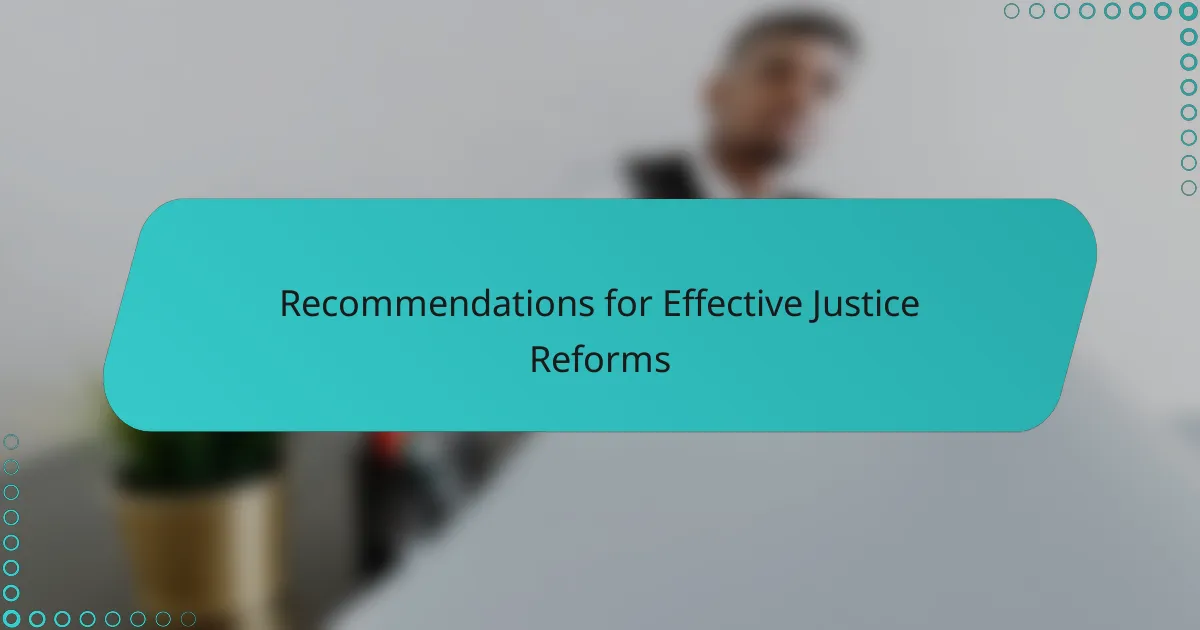
Recommendations for Effective Justice Reforms
When I think about effective justice reforms, I believe they must be rooted in genuine community engagement. Without listening to those most affected, reforms risk becoming top-down mandates that miss the mark. Have you ever been part of a discussion where your concerns were truly heard? That kind of inclusion builds trust and fuels lasting change.
Another key recommendation I hold is the need for sustained political will and adequate funding. From my experience, even the best ideas falter without consistent support; it’s like trying to run a marathon with no energy in your tank. How many promising reforms have you seen stall simply because the resources just weren’t there?
Lastly, transparency and accountability should be non-negotiable pillars in any reform effort. I recall a case where increased transparency led to a remarkable rebuilding of community trust—proof that openness can bridge divides. Don’t you think justice means little if people can’t see that it’s truly being served?
